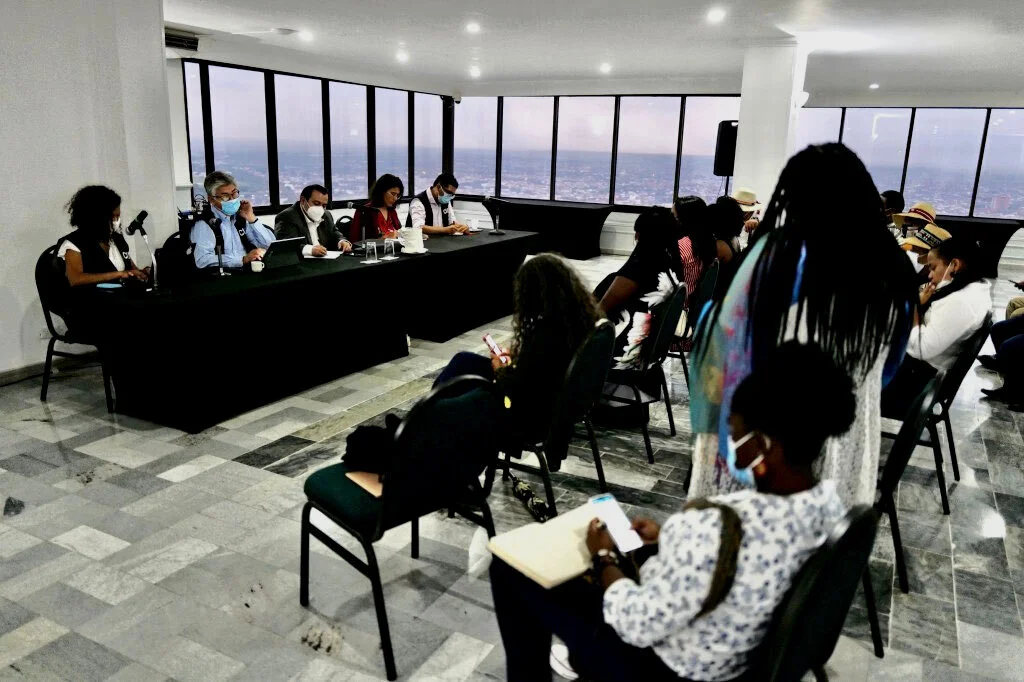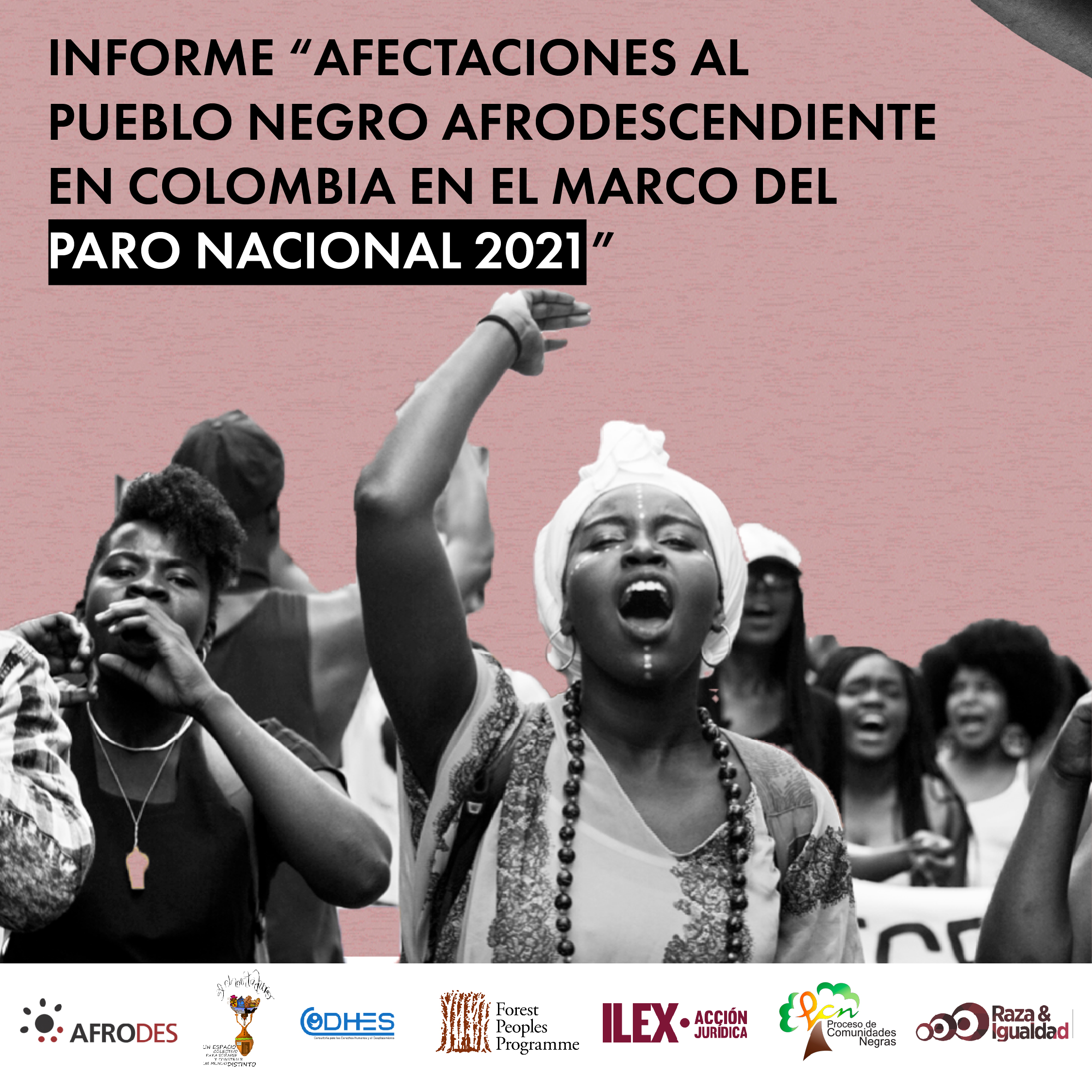For Immediate Release
Para publicación inmediata
Para divulgação imediata
Contact/Contacto/Contato
Elida De Aquino (Coordinadora de Comunicaciones)
elida@afroresistance.org
AfroResistance Stands in Solidarity with the Black Community of Colombia
AfroResistance se solidariza con la Comunidad Negra de Colombia
AfroResistance se solidariza com a Comunidade Negra da Colômbia
May 4, 2021—After a mass strike and mass mobilizations that began on April 28th due to a proposed tax reform, the Colombian government has lashed out with a military styled repression against the millions of protestors currently in the streets. The intention of the repression is simple, to drown and silence the collective demands. This criminal action has led to at least 37 murdered people by armed forces, over one thousand injured including life-altering eye injuries, and at least 10 reported gender based violence, including sexual violence. It also included over 500 detained and multiple aggressions against human rights defenders and observers and journalists. According to reports from Campaña Defender la Libertad Asunto de Todas.
“These manifestations are a just and collective response that many groups including Black groups throughout Colombia have been for decades organizing around, including structural racism, economic injustice, gender inequality, and environmental racism to name a few issues. These issues did not start on April 28th, or during the still existing COVID-19 pandemic. These issues are historical and have been exacerbated due to the pandemic” Says Janvieve Williams Comrie, Executive Director of AfroResistance.
The government has been militarizing several cities in the country, turning the main streets, where women, children and families frequent, into highly dangerous war zones. The deployment of the Mobile Anti-Riot Squad (ESMAD), which is the riot control unit of the Colombian National Police specialized in preventing and/or controlling riots, has resulted in a series of deaths, injuries and disappearances. The Colombian military mechanism has publicly received the support of state officials, where, in the name of defending their integrity and material goods, they use their weapons against protesters, thereby justifying the abuse of force. For this reason, we urge the international community and other human rights organizations to take immediate action to defend the human rights of the people in Colombia and prevent the number of victims from continuing to increase; We also demand that the respective investigations of the various cases that have been presented be carried out in a transparent and immediate manner, avoiding impunity and demanding guarantees for the exercise of social protest in a peaceful and safe manner.
It is important to highlight the role that Black Colombian women have historically played in the struggle against oppression, death and extermination in Colombia. In Colombia, gender violence, is one of the most visible and least heard problems by the government. The rights of Women and Girls have been violated both inside and outside the protests, in urban areas, but also in peripheral (rural) areas where many cases have remained anonymous or have simply become a number. In Colombia, according to the organization, Somos Defensores, during the first quarter of the current year, 26% of the attacks by the security forces occurred against women, many of these cases have not yet been clarified. From AfroResistance, we reiterate once again our support for all Black Women and Girls and the call to respect and preserve their rights.
AfroResistance stands in solidarity with Colombian Black, Women, Trans, Youth, Indigenous, Human Rights and all Social Justice organizations in their call for international organizations and International Human Rights Mechanisms to accompany their demand to mobilize, to protect their lives and preserve their rights and dignity.
It is important to also add that 2012, Colombia signed a bilateral agreement with Haiti to help train and professionalize Haitian police officers.
The mission statement for AfroResistance, is to educate and organize for human rights, democracy and racial justice throughout the Americas. www.afroresistance.org
AfroResistance is a Black Alliance for Peace member organization.
———
ESPAÑOL
AfroResistencia se solidariza con la comunidad negra en Colombia
4 de Mayo 2021. Luego de las movilizaciones masivas que comenzaron el pasado 28 de abril en Colombia, debido a una propuesta de reforma tributaria, el gobierno colombiano ha arremetido con una represión de estilo militar contra los millones de manifestantes que se concentran actualmente en las calles. La intención de la represión es clara, ahogar, atemorizar y silenciar las demandas colectivas. Esta acción criminal ha provocado al menos 37 personas asesinadas por las fuerzas armadas, más de mil heridos, incluidas lesiones oculares con alteraciones de por vida, y al menos 10 denunciados de violencia de género, incluida la violencia sexual. También incluye más de 500 detenidos y múltiples agresiones contra defensores y observadores de derechos humanos y periodistas. Según informes de la Campaña Defender la Libertad Asunto de Todas.
“Estas manifestaciones son una respuesta justa y colectiva en torno a la cual muchos grupos en Colombia, incluidos los negros, se han estado organizando durante décadas visibilizando problematicas incluido el racismo estructural, la injusticia económica, la desigualdad de género y el racismo ambiental, por nombrar algunas. Estos problemas no comenzaron el 28 de abril ni durante la pandemia de COVID-19 aún existente; son históricos y se han agravado debido a la pandemia ”, dice Janvieve Williams Comrie, directora ejecutiva de AfroResistance.
El gobierno ha venido militarizando varias ciudades del país, convirtiendo las principales calles, donde las mujeres, los niños y las familias frecuentan, en zonas de guerra de alta peligrosidad.
El despliegue del Escuadrón Móvil Antidisturbios (ESMAD), que es la unidad de control de disturbios de la Policía Nacional de Colombia especializada en prevenir y / o controlar disturbios, ha dejado como resultado una serie de muertes, personas heridas y desapariciones.
El mecanismo militar ha recibido públicamente el apoyo de funcionarios del estado, donde en nombre de la defensa de su integridad y los bienes materiales, hagan uso de sus armas contra manifestantes justificando con esto el abuso de la fuerza. Por esto instamos a la comunidad internacional y demás organismos de derechos humanos a tomar acciones inmediatas para defender los derechos humanos de la gente en Colombia y evitar que las cifras de víctimas continúen en aumento; así como también exigimos se adelanten de manera transparente e inmediata las respectivas investigaciones de los diversos casos que se han presentado, evitando la impunidad y exigiendo garantías para el ejercicio de la protesta social de manera pacífica y segura.
Es importante destacar el papel que históricamente ha venido desempeñando la mujer de manera activa, en sus luchas contra las fuerzas de la opresión, la muerte y el exterminio, siendo esta, otra de las razones de la marcha, ya que la violencia de género, es uno de los problemas más visibles y menos escuchados por parte del gobierno. Los derechos Mujeres y niñas vienen siendo vulnerados dentro y fuera de las protestas, en áreas urbanas pero también en áreas periféricas (rurales) donde muchos casos han quedado en el anonimato o simplemente pasan a ser una cifra más. De acuerdo con la organización, Somos Defensores, en Colombia durante el primer trimestre del año en curso, el 26% de las agresiones por parte de la fuerza pública ocurrió contra mujeres, y muchos de esos casos aún no han sido esclarecidos. Desde AfroResistencia, reiteramos una vez más nuestro apoyo a nuestras hermanas y el llamado a respetar y preservar sus derechos.
AfroResistance se solidariza con las organizaciones Negras, organizaciones de Mujeres, organizaciones Trans, organizaciones juveniles, Indígenas, organizaciones de Derechos Humanos y de justicia social Colombianas en su llamado a que las organizaciones internacionales y de Mecanismos Internacionales de Derechos Humanos acompañen su demanda de movilizarse, proteger sus vidas y preservar sus derechos y dignidad.
Es importante agregar también que en 2012 Colombia firmó un acuerdo bilateral con Haití para ayudar a capacitar y profesionalizar a los policías haitianos.
La misión de AfroResistance es educar y organizar por los derechos humanos, la democracia y la justicia racial en las Américas. www.afroresistance.org
———
PORTUGUÊS
AfroResistencia se solidariza com a comunidade negra da Colômbia
4 de maio. Após as massivas mobilizações iniciadas devido a uma proposta de reforma tributária em 28 de abril na Colômbia, o governo colombiano atacou com repressão militar milhões de manifestantes que atualmente estão concentrados nas ruas. A intenção da repressão é clara: afogar, amedrontar e silenciar as demandas coletivas. Esta ação criminal já causou pelo menos 37 pessoas mortas pelas forças armadas, mais de mil feridos, incluindo ferimentos nos olhos com impactos para o resto da vida e pelo menos 10 denúncias de violência de gênero, incluindo violência sexual. Também inclui mais de 500 detidos e vários ataques contra defensores de direitos humanos, observadores e jornalistas. De acordo com relatórios da Campaign Defend Liberty Affair of All.
“Essas manifestações são uma resposta justa e coletiva em torno do qual muitos grupos, incluindo pessoas negras na Colômbia, vem se organizando durante décadas, incluindo o racismo estrutural, a injustiça econômica, a desigualdade de gênero e o racismo ambiental, para mencionar alguns problemas. Esses problemas não começaram no dia 28 de abril ou durante a pandemia de COVID-19 ainda existente. Esses problemas são históricos e foram agravados pela pandemia”, disse Janvieve Williams Comrie, Diretora Executiva da AfroResistance.
O governo tem militarizado várias cidades do país, transformando as principais ruas, frequentadas por mulheres, crianças e famílias, em zonas de guerra altamente perigosas. A implantação do Esquadrão Móvel Antimotim (ESMAD), unidade de controle de distúrbios da Polícia Nacional da Colômbia especializada na prevenção e/ou controle de rebeliões, resultou em uma série de mortes, feridos e desaparecimentos.
O mecanismo militar recebeu publicamente o apoio de funcionários do Estado, onde em nome da defesa de sua integridade e bens materiais, usam suas armas contra os manifestantes, justificando o uso excessivo da força. Por isso, pedimos à comunidade internacional e outras organizações de direitos humanos que tomem medidas imediatas para defender os direitos humanos do povo na Colômbia e evitar que o número de vítimas continue a aumentar. Exigimos também que as respectivas investigações dos diversos casos apresentados sejam efetuadas de forma transparente e imediata, evitando a impunidade e exigindo garantias para o exercício do protesto social de forma pacífica e segura.
É importante destacar o papel que as mulheres historicamente vêm desempenhando ativamente em suas lutas contra as forças de opressão, morte e extermínio, sendo este mais um motivo da marcha, já que a violência de gênero é um dos problemas mais visíveis e menos ouvidos pelo governo. Os direitos de nossas mulheres e meninas foram violados dentro e fora dos protestos, em áreas urbanas, mas também em áreas periféricas (rurais) onde muitos casos permaneceram anônimos ou simplesmente se tornaram mais uma estatística. Segundo a organização Somos Defensores, na Colômbia durante o primeiro trimestre deste ano, 26% dos ataques das forças de segurança ocorreram contra mulheres e muitos desses casos ainda não foram esclarecidos. Nos da AfroResistencia, reiteramos mais uma vez nosso apoio a todas as mulheres e meninas negras e nosso apelo ao respeito e preservação de seus direitos.
AfroResistance se solidariza com organizações negras, organizações femininas, organizações trans, organizações juvenis, povos indígenas e organizações colombianas de direitos humanos e justiça social em seu apelo para que as organizações internacionais e os mecanismos internacionais de direitos humanos acompanhem sua demanda de mobilização, proteção e preservação seus direitos e dignidade.
Também é importante acrescentar que em 2012 a Colômbia assinou um acordo bilateral com o Haiti para ajudar a treinar e profissionalizar os policiais haitianos.
A missão do AfroResistance é educar e organizar os direitos humanos, a democracia e a justiça racial em todos os países das Américas. www.afroresistance.org
Banner photo: Proceso Comunidades de Negras (PCN or Black Communities Process, an African organization in Colombia)

















